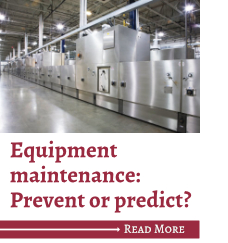So, you’ve developed a preventive or predictive maintenance program that includes the most skilled workers and advanced sensory technology. But now what?
Even in the most efficient bakery operation, a good maintenance program requires continuous improvement.
“No program is perfect,” said Jim Kline, president, the EnSol Group and Baking & Snack contributing editor. “A fan or belt chain might break, and if you’ve been doing regular preventive maintenance, it means you need to review the plan. Maintenance is about not only having it in place but also reviewing its performance and improving as necessary.”
Maintenance is a lot like weight management or personal health. In general, everyone knows what needs to be done to avoid a breakdown; it’s just a matter of putting it into practice.
“I’d say (a good maintenance program) requires a cultural shift,” said Rowdy Brixey, president and chief executive officer, Brixey Engineering, Inc. “The problem that allows (poor maintenance) to fester is often a lack of accountability. Rarely is it a complete lack of knowledge of what you need to be doing.”
Bühler’s preventive maintenance tools offer outputs to help bakers stay on top of equipment upkeep. For a small additional charge and annual license fee, ProPlant can schedule preventive maintenance jobs and data backup.
 “It triggers messages and alarms when a preventive job is pending or if a corrective task has to be done,” said John Hunter, sales account manager, bakery and ingredient handling, Bühler, Inc.
“It triggers messages and alarms when a preventive job is pending or if a corrective task has to be done,” said John Hunter, sales account manager, bakery and ingredient handling, Bühler, Inc.
If an operation runs to failure, either it suffered from poor — or no — data, or it wasn’t properly using the data available.
“Run-to-failure scenarios are preventable through proper care and feeding of the system,” said Jason Stricker, director of sales and marketing, Shick Esteve.
“When new equipment is put into service, it is imperative that adequate time be allocated for maintenance training and setting up a preventive maintenance system,” said Bruce Campbell, vice-president, global product technology, AMF Bakery Systems. “We’ve had great benefits from combined operator/maintenance/sanitation training so everyone understands their role in keeping equipment in proper operating condition.”
At the end of the day, if predictive or preventive maintenance isn’t being routinely conducted, something on the line is destined to fail.
“You have to ‘inspect’ what you ‘expect,” Mr. Brixey said. “Perform routine maintenance inspections and engage management to follow up on the quality of those inspections. Trust, but verify, and then hold people accountable.”
It’s the best way to run equipment when failure is not an option.




